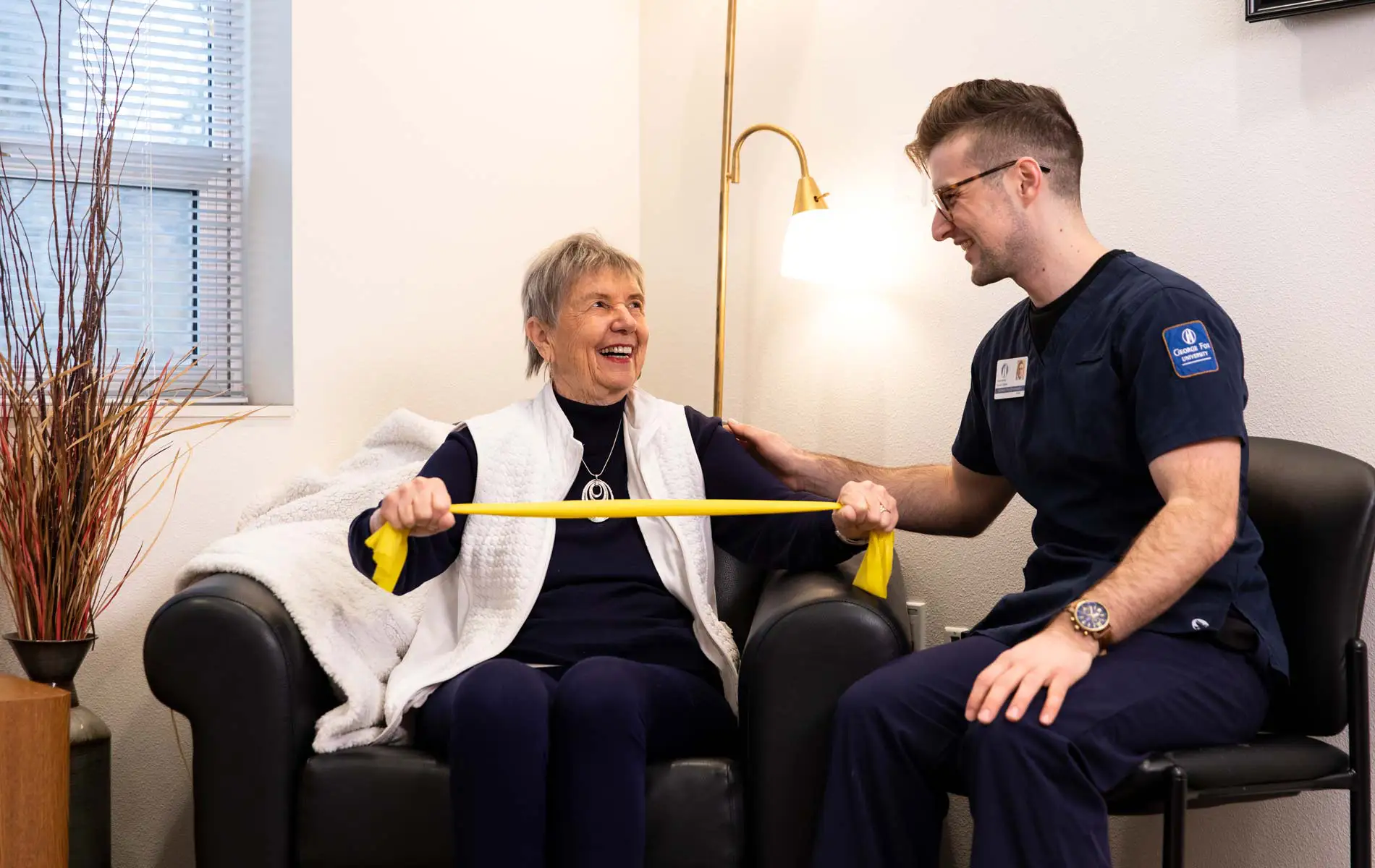by Brooklyn Chillemi, based on an interview with Stanley Paul, occupational therapy director
While some may see driving, folding laundry or scrubbing the dishes as mundane tasks, an occupational therapist knows that mastering these everyday activities represents freedom and a degree of independence for many.
If you’re interested in helping patients master their daily living skills following an injury or illness, becoming an occupational therapist may be an ideal position for you – and the field is only growing. The employment of occupational therapists is projected to grow 14% from 2021 to 2031, much faster than the 5% average growth projection for all occupations, making now the perfect time to pursue a job in the field.
Do I need a master’s degree or a doctorate to become an occupational therapist?
Right now, occupational therapy is considered a dual-entry field, meaning you can secure an entry-level occupational therapy position with either a master’s or doctoral degree. But as occupational therapy expands, those holding a doctorate degree are rising to the top.
Experts in the field are seeing a shift from dual entry to a strong preference for doctoral degrees, especially for high-level occupational therapy positions. As of April 2023, the Accreditation Council for Occupational Therapy (ACOTE) reports that over 30 accredited master’s degree programs are transitioning to the doctoral degree level (source). As a student studying occupational therapy, choosing a doctoral degree will give you a leg up.
In the near future, many believe the field of occupational therapy will shift away from dual-entry programs (accepting either a master’s or a doctorate to be certified) and instead focus solely on doctorate programs. Other medical fields, such as physical therapy, have already made the switch to requiring a doctorate after originally accepting a masters. It’s expected that occupational therapy will do the same. By earning your doctorate now, you will be ahead of the curve in evidence-based practice and a competitive candidate for the widest range of jobs.
Plus, earning your doctorate opens doors for teaching and research for which having a master’s degree isn’t enough. As you continue to grow in your field, more opportunities arise for job openings and connection-building.
What does a master’s degree in occupational therapy require?
A master’s degree in occupational therapy (OTM) typically takes about two years to complete, including academic coursework and some clinical experience. During this time, students learn about the theoretical foundations of occupational therapy, as well as how to conduct evaluations, develop treatment plans, and work with patients.
What does a doctorate in occupational therapy require?
First offered in 1999, an entry-level doctorate in occupational therapy (OTD) typically takes about three years to complete. An OTD is designed to provide evidence-based practice to further knowledge and skills – including leadership, advanced clinical practice, education, and research in the field.
Is there a difference in pay between those who have a master’s degree and a doctorate in occupational therapy?
Occupational therapists typically make between $60,680 and $123,840 a year in the United States with a median salary of $85,570. Although no data currently exists comparing the salaries of occupational therapists by degree type, as the field shifts more and more toward doctoral degrees, earning a doctorate now will give you the best chance of landing the best job.
Additionally, those with doctorates in occupational therapy are eligible for research and teaching positions, which tend to pay more than entry-level positions.

Can you earn your doctorate after you’ve already earned your master’s degree?
You can. It’s usually easier to dive into the doctorate program first, and you’ll save time and money by doing so, but if you’ve already earned your master’s degree, you can return to earn your doctorate at one of the over 80 ACOTE-accredited OTD programs in the U.S.
What is a capstone project, and are those solely in doctorate programs?
In both a doctorate program and a master’s program, you will have the opportunity to focus on an area of interest in occupational therapy by creating a hands-on experience toward that specialization. This can look like a research project, fieldwork, or something else, depending on what you would like to specialize in.
This grants you an extensive background in research and scholarly inquiry through evidence-based practice, making you well-versed in using the most up-to-date and effective assessment and treatment models.
What are fieldwork rotations, and where can I complete them?
Before you enter the field, both master’s and doctorate programs require fieldwork rotations or clinical experience. This typically occurs within the last six months of your program, and your coursework throughout the program gives you the tools you need for your fieldwork experience.
At George Fox University, rotations can be completed in traditional and non-traditional settings, including hospitals, medical centers, rehab facilities, mental health settings, pediatric hospitals, home care settings, nursing homes, and assisted living facilities, to name a few.
Where can I find details about licenses, exams, prerequisites, and observation hours?
After completing an accredited program and required fieldwork, you’ll need to pass the NBCOT Certification Exam and apply for your license in the state you wish to practice in.
Assistance with specific details like these may vary based on the program, but most will guide you through the initial requirements for licensure.
Learn more about George Fox University’s occupational therapy doctorate (OTD) program in Newberg, Oregon.
